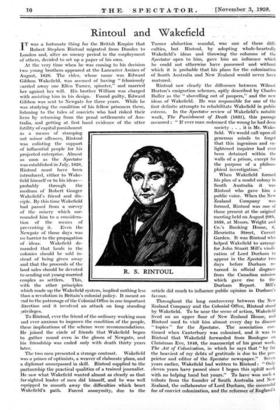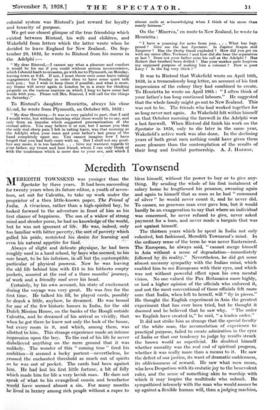Rintoul and Wakefield
IT was a fortunate thing for the British Empire that Robert Stephen Rintoul migrated from Dundee to London and, after an uneasy period in the employment of others, decided to set up a paper of his own.
To Rintoul, ever the friend of the ordinary working man and ever anxious to improve the condition of the people, these implications of the scheme were recommendations. He joined the circle of friends that Wakefield began to gather round even in the gloom of Newgate, and his friendship was ended only with death thirty years later.
The two men presented a strange contrast. Wakefield was a prince of optimists, a weaver of elaborate plans, and a diplomat unsurpassed in skill. Rintoul supplied to the partnership the practical qualities of a trained journalist. He saw what Wakefield wanted almost as clearly as that far-sighted leader of men did himself, and he was well equipped to smooth away the difficulties which beset Wakefield's path. Forced anonymity, due to the Turner abduction scandal, was one of these diffi- culties, but Rintoul, by adopting whole-heartedly Wakefield's ideas and throwing the columns of the Spectator open to him, gave him an influence which he could not otherwise have possessed and without which it is probable that his plans for the colonization of South Australia and New Zealand would never-have matured.
R. S. RINTOUL
When Wakefield formed his plan of a model colony in South Australia it -was Rintoul who gave him a public voice. When the New Zealand Company was formed, Rintoul_ was one of those present at the original meeting held on August 29th, 1838, at Messrs; Wright and Co.'s Banking House, 6, Henrietta Street, Covent Garden. It was Rintoul who helped Wakefield to arrange for John Stuart Mill's vindi- cation of Lord Durham to appear in the Spectator two days before Durham re- turned in official disgrace from the Canadian mission which gave rise to the Durham Report. Mill's article did much to influence public opinion in Durham's favour.
Throughout the long controversy between the New Zealand Company and the Colonial Office, Rintoul stood by Wakefield. To be near the scene of action, Wakefield lived on an upper floor of Nov Zealand House, and Rintoul used to visit him almost every day to discuss " topics " for the Spectator. The association con- tinued when _Canterbury was colonized, and it was to Rintoul that Wakefield forwarded from Boulogne on Christmas Eve, 1848, the manuscript of his great work, The Art of Colonization, in which he says that " by far the heaviest of my debts of gratitude is due to the pro- prietor and editor of the Spectator newspaper." Seven years earlier, Wakefield had written to Rintoul " Only eleven years have passed since I began this uphill work with no helping hand but yours." To have won such a tribute from the founder of South Australia and New Zealand, the collaborator of Lord Durham, the successful foe of convict colonization, and the reformer of England's colonial system was Rintoul's just reward for loyalty and tenacity of purpose.
We get our closest glimpse of the true friendship which existed- between Rintoul, his wife and children, and Wakefield from letters which the latter wrote when he decided to leave - England for New Zealand.. On Sep- tember 29, 1852, he wrote -to Rintoul from his rooms in the Adelphi • " My dear Rintoul,—I cannot say what a pleasure and comfort it would be for me if you could .without serious inconvenience, which I should loath to occasion, go with me to Plymouth;on Monday, leaving town at 9.45. If not, I must throw over some leave taking engagements for Sunday in order then to have some quiet talk with you ; but I wish to keep them if possible, and what is more, my brains will never again in London be in a state for thinking properly on the various matters on which I long to have some last words with you. Please tell Mrs. Rintoul, I will call for the things on Saturday:" To Rintoul's daughter Henrietta, always his close Maid, he wrote from Plymouth, on October 8th, 1852 : " My deai Henrietta,—It was -so very painful to part, that-I said I would write,-but without knowing what there would be to say, and only from an impulse which suggested procrastination of the eternal adieu. You may believe it or not, but I assure you that the only real sharp pain I felt in taking leave, was that morning at the Adelphi when your tears and your father's last grasp of the hand completely upset me. You cannot imagine how I have longed that you had both come with us. But I shall not say good- bye any more, it is too hateful. . . . Give my warmest regards to your father, my truest and best friend, whom I can only think of with the tenderness *which is more due to your sex, and which I
almost smile at acknowledging when I think of his more than manly fairness."
On the ':Minerva,' en route to New Zealand, he wrote to Henrietta " I have a yearning for news from you. . . What has hap- pened ? Give me the last Spectator. Is Jupiter Scapin still Emperor ? Has the Derby fraud exploded ? How did you get on with my sister (Mrs. Torlesse) ? and how did she bear the separation at last ? Does not your father miss his call at the Adelphi ? Has Robert (her brother) been drilled ? Has your mother quite forgiven my supposed purpose of making him a colonist ? How is poor Lucy ! Is the fog very thick ? "
It was to Rintoul that Wakefield wrote on April lath, 1853, in a tremendously long letter, an account of his first impressions of the colony they had combined to create. To Henrietta he wrote on April 19th : " I often think of your father's too long continued labours." He suggested that the whole family might go out to New Zealand. This was not to be. The friends who had worked together for so long never met again. As Wakefield felt within himself on that October morning the farewell in the Adelphi was a last farewell. When Rintoul did finish his work on the Spectator in .1858, only to die later in the same year, Wakefield's active work was also done. In the declining years of both great men nothing could have given them more pleasure than the contemplation of the results of their long and fruitful partnership. A. J. HARROP,



















































































































 Previous page
Previous page